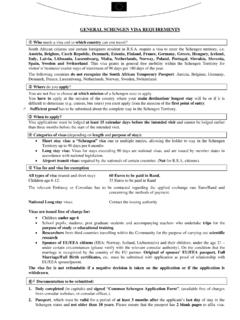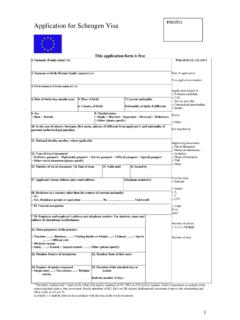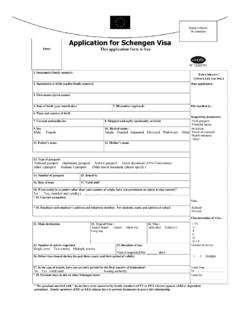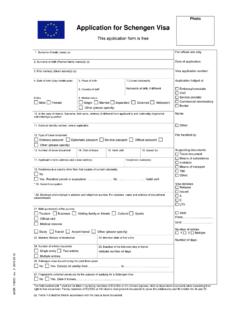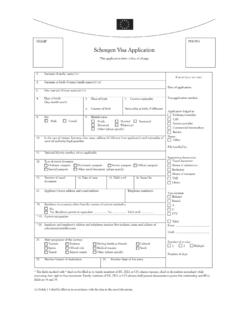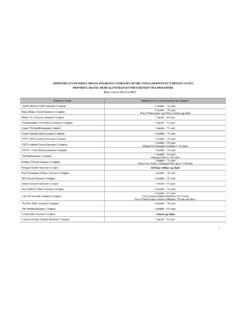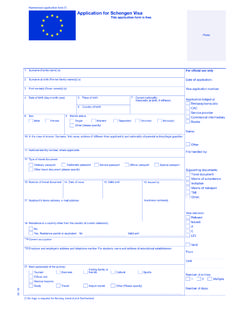Transcription of COMMON INFORMATION SHEET FOR SCHENGEN …
1 COMMON INFORMATION SHEET . FOR SCHENGEN visa APPLICANTS IN INDIA. WHAT IS A SCHENGEN SHORT STAY visa ? It is an authorisation issued by one of the Member States of the SCHENGEN Area with a view to transit through or an intended stay in the territory of the Member States of a duration of no more than 90 days (short stay) in any 180 day period. The processing of visa applications is based on THE visa CODE Regulation (EC) No 810/2009 of the European Parliament and of the Council of July 2009. INFORMATION given below is also based on this Regulation. WHICH COUNTRIES ISSUE SCHENGEN visa ? There are currently 26 European countries in the SCHENGEN Area, 22 of which are member states of the European Union. These 26 countries share a COMMON legal framework and there are no checks on the borders between them. The countries issuing SCHENGEN visas are: Austria*, Belgium*, the Czech Republic*, Denmark*, Estonia*, Finland*, France*, Germany*, Greece*, Hungary*, Iceland, Italy*, Latvia*, Liechtenstein, Lithuania*, Luxembourg*, Malta*, the Netherlands*, Norway, Poland*, Portugal*, Slovakia*, Slovenia*, Spain*, Sweden* and Switzerland.
2 * European Union Member States More INFORMATION on the SCHENGEN Area can be obtained visiting the following website: visas/ WHAT TYPES OF SCHENGEN visa EXIST? 1) SHORT STAY visa : UNIFORM visa : the holder of a uniform visa is allowed to travel to the States mentioned above for a period of max 90 days during any 180-day period. In order to calculate the period of allowed stay the applicant can consult the short stay calculator available on the website of the Directorate-General for Home Affairs of the European Commission visa WITH LIMITED TERRITORIAL VALIDITY: the holder of a visa with limited territorial validity is allowed to travel to the State(s) indicated on the visa sticker but not to any of the other SCHENGEN States. 2) AIRPORT TRANSIT visa : the holder of an airport transit visa is allowed to transit through the international transit areas of the issuing State and possible other States, if indicated on the visa sticker. Airport transit visa is required by the nationals of 1.
3 Afghanistan, Bangladesh, Democratic Republic of Congo (Zaire), Eritrea, Ethiopia, Ghana, Iran, Iraq, Nigeria, Pakistan, Somalia and Sri Lanka. Please note that some Member States can require Airport Transit Visas for Indian nationals, a list can be found here. Please note that long stay visas are issued according to the national regulations of each Member State. All relevant INFORMATION can be obtained from the Diplomatic or Consular Missions of the Member States. Useful INFORMATION can also be obtained via the EU Immigration Portal VALIDITY OF PASSPORTS. The applicant shall present a valid travel document (passport) the validity of which extends at least three months after the intended date of departure from the territory of the Member States (or, in the case of several visits, after the last intended date of departure from the territory of the Member States). It shall contain at least two blank pages and shall have been issued within the previous 10. years. Please note that as per INFORMATION received from the Indian Authorities, handwritten and not machine readable passports are no longer issued and manual changes in Indian passports are no longer permitted since April 1st 2010.
4 The SCHENGEN states' consulates thus do not accept: (1) Handwritten or not machine readable Indian passports issued after 01/04/2010;. (2) Indian passports that contain a manual entry (observation) made after 01/04/2010 if the biographical data (biodata) of the passport holder were changed. HOW MANY TIMES CAN I USE MY SCHENGEN visa ? On the visa sticker the number of entries is indicated: 1 , 2 or "MULT". The holder of a multiple entry visa ("MULT") may enter the SCHENGEN area unlimited number of times during the validity of the visa while respecting the rules on duration of stay. WHO CAN APPLY FOR A SCHENGEN visa IN INDIA? Indian nationals and nationals of other countries legally residing in India can apply. Persons who do not reside in India may only apply if they are legally present in India and can present a justification for lodging an application in India rather than in their country of residence. WHICH MEMBER STATE IS COMPETENT FOR EXAMINING AND DECIDING ON MY visa .
5 APPLICATION? The Member State competent for examining and deciding on an application for a uniform visa shall be: (a) the Member State whose territory constitutes the sole destination of the visit(s). (b) if the visit includes more than one destination, the Member State whose territory constitutes the main destination of the visit(s) in terms of the length or purpose of stay. (c) if no main destination can be determined, the Member State whose external border the applicant intends to cross first in order to enter the territory of the Member States. For more INFORMATION regarding the competent consulate of the Member State (if there are more than one) and INFORMATION regarding possible commercial intermediates and external service providers, please visit the web pages of the Member States indicated below. 2. WHAT TO DO IF A SCHENGEN COUNTRY DOES NOT HAVE AN EMBASSY/CONSULATE IN. INDIA? If a SCHENGEN country does not have an Embassy/Consulate in India, or if the present Embassy/Consulate is not issuing visas, a SCHENGEN visa application may be submitted to the SCHENGEN state which "represents" this country for visa matters.
6 Please note that applications can be submitted to an external service provider. You are encouraged to check the websites of relevant SCHENGEN countries in order to know where you can lodge your application. Please also take note of the following: - a SCHENGEN visa application for Greece in Goa shall be submitted to the Portuguese Consulate General in Goa. - a SCHENGEN visa application for Slovakia in Mumbai shall be submitted at the Consulate General of Hungary in Mumbai. - a SCHENGEN visa application for Slovenia in Goa shall be submitted at the Consulate General of Portugal in Goa. - a SCHENGEN visa application for Iceland shall be submitted at the Danish Embassy in New Delhi. - a SCHENGEN visa application for Liechtenstein shall be submitted at the Embassy of Switzerland in New Delhi. WHAT HAPPENS IF THE APPLICATION IS LODGED WITH THE MEMBER STATE OR THE. CONSULATE THAT IS NOT COMPETENT FOR EXAMINING AND DECIDING ON MY. APPLICATION? When an application has been lodged, the Consular post verifies whether it is competent for examining and deciding upon it.
7 If it is not competent, it will, without delay, return the application form and any documents submitted by the applicant, reimburse the visa fee, and indicate which consulate is competent. visa FEE. Applicants shall pay a visa fee of EUR 60. Children from the age of six years and below the age of 12 years shall pay a visa fee of EUR 35. Nationals from the Russian Federation, Ukraine, Georgia, Cape Verde, Armenia and Azerbaijan shall pay a visa fee of EUR 35. This also applies to citizens of Albania, Bosnia-Herzegovina, the Former Yugoslav Republic of Macedonia (FYROM), Montenegro, the Republic of Moldova and Serbia NOT holding biometric passports. In most Embassies the visa fee must be paid in local currency. Some consulates also accept payment by credit card, for modes of payment contact the Embassy in question. APPLICANTS FOR WHOM THE visa FEE IS WAIVED. (1) Children under six years;. (2) School pupils, students, postgraduate students and accompanying teachers who undertake stays for the purpose of study or educational training.
8 3. (3) Researchers from third countries travelling for the purpose of carrying out scientific research as defined in Recommendation No 2005/761/EC;. (4) Representatives of non-profit organizations aged 25 years or less participating in seminars, conferences, sports, cultural or educational events organised by non-profit organisations. The visa fee may be waived for applicants belonging to one of the following categories: (1) Children from the age of six years and below the age of 12 years;. (2) Holders of diplomatic and service passports;. (3) Participants aged 25 years or less in seminars, conferences, sports, cultural or educational events, organised by non-profit organisations. INFORMATION regarding visa fee waivers that may be provided by SCHENGEN states and additional visa fee waivers for specific categories of applicants can be found on the web sites of the Member States below. HOW LONG BEFORE THE START OF THE INTENDED VISIT SHOULD I APPLY? It is advisable to lodge the application as early as possible and at least 15 calendar days before the intended visit.
9 Please note that applications can be lodged no more than three months before the start of the intended visit. Holders of a multiple-entry visa may lodge the application before the expiry of the visa valid for a period of at least six months. DO I NEED AN APPOINTMENT FOR SUBMITTING MY APPLICATION? Applicants may be required to obtain an appointment for the lodging of an application. You are invited to check the websites of the Member States via the links below. WHAT SUPPORTING DOCUMENTS ARE TO BE ATTACHED TO MY APPLICATION? Check the website of the Member States through the links below. Please note that during the examination of your application the consular post may in individual cases request additional documents and you may be called for an interview. BIOMETRICS COLLECTION. As from 2 November 2015 following the introduction of the visa INFORMATION System (VIS), all SCHENGEN visa applicants in India have to appear in person in order to provide biometric data (fingerprints and digital photography).
10 The photograph can be digitally taken at the time of the application or scanned from an existing one. For subsequent applications within 5 years the fingerprints can be copied from the previous application file in the VIS. In case of reasonable doubt regarding the identity of the applicant, the consulate will collect again fingerprints within the 5 year period specified above. Furthermore, the applicant may request that 4. they be collected if, at the time when the application is lodged, it cannot be immediately confirmed that the fingerprints were collected within this 5 years period. visa applicants' biometric data can be collected by SCHENGEN States' consulates and external service providers but not commercial intermediaries ( travel agencies). WHO IS WAIVED FROM THE REQUIREMENT TO GIVE FINGERPRINTS? The following applicants shall be exempt from the requirement to give fingerprints: [Please note that applicants falling under category (b) must still appear personally at a consulate or external service provider].

